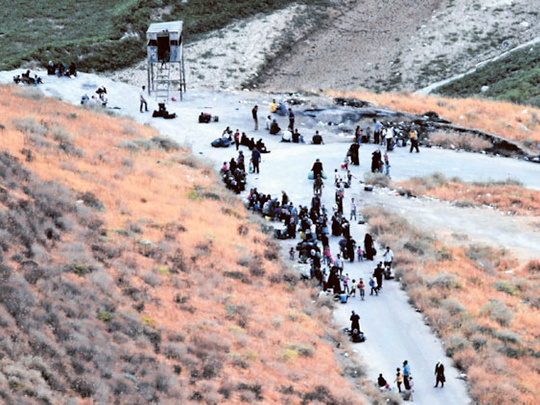
London: Syria’s disparate rebel brigades are trying to unite under a new name and the leadership of a Jordan-based general, in what the fighters say is an attempt to respond to international and Arab calls for more co-ordination.
Rebel leaders say that after two days of talks in Turkey that brought together a range of rebel groups that have been fighting under the brand of the Free Syrian Army, an understanding has been reached for the formation of the Syrian National Army led by Mohammad Al Haj Ali, the longest-serving general to have defected so far.
The effort at greater unity will have to be tested. It has already faced criticism from some of the brigades as well as Colonel Riad Al Assad, who was the first to create the FSA brand last year.
“There’s a lot of unease about changing the name of the FSA,” he told the Financial Times on Wednesday. “This name has been etched in the minds of Syrians now, even children.”
The new push for more unity comes amid growing international concern over divisions within rebel ranks and fears that funds and weapons could be falling into the hands of extremists who have joined the fight to bring down the regime of Bashar Al Assad.
Joseph Bahout, a Paris-based Middle East expert, said the role of Gen Al Haj Ali - who defected last month - and the restructuring of the FSA should be seen in a broader context of an international push to upgrade the technical help to the armed Syrian opposition and give it a more acceptable outlook.
Expectations of more international covert involvement with the rebels follow the collapse of diplomatic efforts to resolve the more than 17-month conflict.
A group of states - chiefly Qatar, Saudi Arabia and Turkey - are already providing assistance to the fighters, including funding, weapons and logistical support, while some western governments are stepping up their non-lethal help.
Western military experts, however, say the rebels remain a fractious and undisciplined force without a credible chain of command.
There also has been mounting concern about reports of torture and summary execution by the fighters, crystallised by a video circulated last month which appeared to show them killing members of a pro-regime clan in Aleppo in cold blood.
Earlier this month, dozens of rebel groups signed up to a “code of conduct” pledging not to engage in any abuses.
Mustafa Al Shaikh, head of the FSA military council, said the aim of the restructuring was to create a “real military institution” and encourage greater assistance from abroad.
“We want to remove the idea that we are not united, which is used as an excuse not to help us,” he said by telephone from his base at the Turkish-Syrian border. “We also need to build an institution and be more responsible and ready for when the regime collapses.”
Another person familiar with the talks in Turkey said that Gen Al Haj Ali appeared to be secular-minded and to have international backing, which appealed to some rebel groups.
Louay Al Mokdad, a logistics co-ordinator with the FSA, said the local brigades and military councils (which group together several brigades) present at the meetings were “positive and encouraging” but were now waiting for Gen Al Haj Ali to outline a clear strategy and “mechanisms” for funding and weapons provisions.
Financial Times












